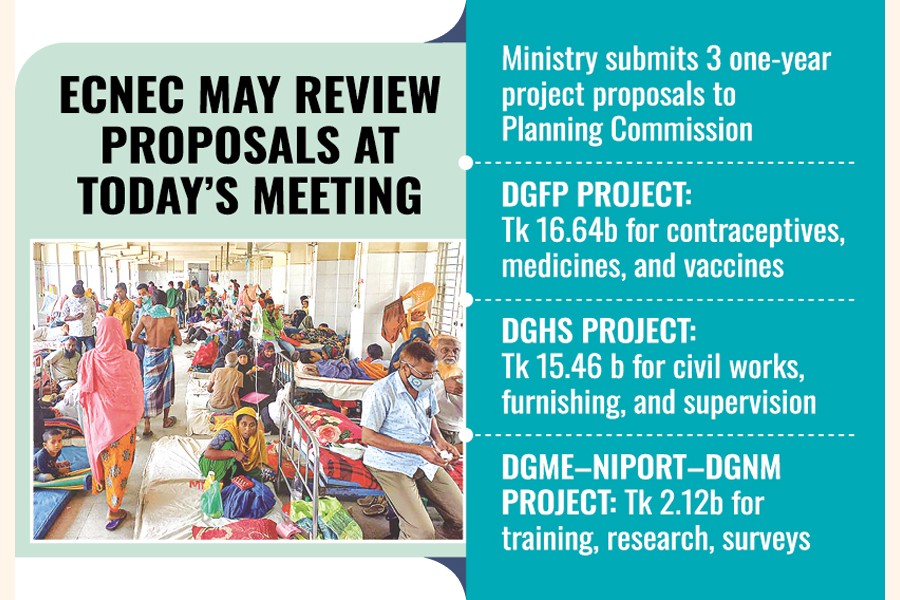Health ministry seeks Tk 34.22 billion in emergency funds to sustain services

Published :
Updated :

The Ministry of Health and Family Welfare is seeking Tk 34.22 billion in emergency spending -- entirely from domestic sources -- to meet urgent healthcare needs beyond the existing budget allocation for the current fiscal year (2025-26).
Officials said the ministry has submitted three separate one-year projects, covering July 2025 to June 2026, to the Planning Commission to secure the funds.
These projects aim to complete the remaining activities under the fourth phase of the Health, Population and Nutrition Sector Programme (HPNSP), which ended in June 2024, and to ensure uninterrupted delivery of essential health services until new comprehensive projects are approved.
Proposals submitted by the Health Services Division and the Medical Education and Family Welfare Division have already been reviewed by the Planning Commission and are scheduled to be placed at the next meeting of the Executive Committee of the National Economic Council (ECNEC) today (Monday).

An analysis of the three projects shows that Tk 21.81 billion, or 63.91 per cent of the total outlay, will go to revenue expenses, while the remaining Tk 12.41 billion is earmarked for capital expenditure.
A major share -- Tk 11.70 billion, or about 34.19 per cent of the total allocation -- has been proposed for the procurement of contraceptives, medicines, prophylactics, and IUD Norplants. Of this, contraceptives alone will require Tk 9.47 billion, while medicines and prophylactics will cost Tk 1.93 billion.
In capital expenditure, Tk 8.58 billion, or 25.06 per cent of the total, has been proposed for the construction and completion of non-residential buildings across the three projects, making it the second-largest spending component.
Sources said the health ministry implemented the fourth phase of the HPNSP at a total cost of Tk 493.75 billion, with 38.29 per cent financed through foreign loans and grants.
To maintain continuity, the ministry has designed the fifth phase of the programme, estimated at over Tk 1.06 trillion for the next five years, with around 23.95 per cent expected from foreign assistance.
However, after more than 50 meetings of the Project Evaluation Committee (PEC) at the Planning Commission, the ministry decided to abandon the full sectoral programme modality -- applied since 1984 -- and adopt project-based development initiatives.
Although nearly half a dozen projects were earlier submitted by the ministry's two divisions, the Planning Commission withheld approval, citing concerns over premature project initiation, lack of feasibility studies, inflated allocations under certain heads, and weaknesses in project management.
Recently, Health and Family Welfare Adviser Nurjahan Begum sent a demi-official letter to Planning Adviser Dr Wahiduddin Mahmud, requesting expedited approval of three one-year projects.
According to the proposals, the Directorate General of Family Planning (DGFP) will implement a project worth Tk 16.64 billion, focusing mainly on procuring contraceptives, medicines, and vaccines -- nearly 70 per cent of its total cost.
The project aims to reduce maternal and child mortality, prevent adolescent pregnancies, and stabilise the fertility rate. Only Tk 5.0 million has been allocated for infrastructure, as the project primarily supports ongoing service delivery.
The Directorate General of Health Services (DGHS) will carry out another project worth Tk 15.46 billion, primarily to complete unfinished civil works at hospitals, health complexes, and clinics. About 75 per cent of its budget will go to construction and furnishing, with the rest for management, supervision, and training.
A third project, worth Tk 2.12 billion, will be implemented by the Directorate General of Medical Education (DGME), the National Institute of Population Research and Training (NIPORT), and the Directorate of Nursing and Midwifery (DGNM).
It focuses on training health educators, completing pending national surveys such as the Bangladesh Demographic and Health Survey (BDHS) and the Bangladesh Health Facility Survey (BHFS), and upgrading simulation labs.
About 88 per cent of the project cost will fund operational and research activities, while Tk 30 million is set aside for lab renovations and minor repairs.
jahid.rn@gmail.com


 For all latest news, follow The Financial Express Google News channel.
For all latest news, follow The Financial Express Google News channel.